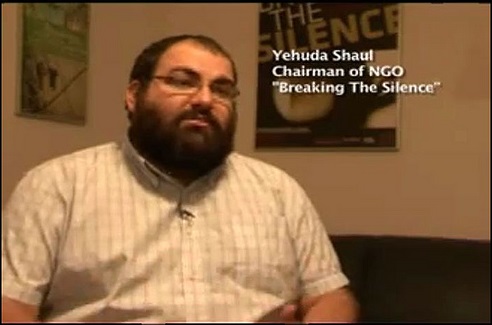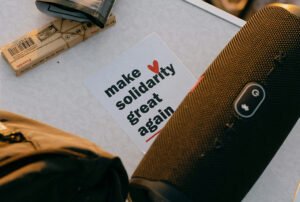
Yehuda Shaul, Breaking The Silence, Salaam Shalom
June 2, 2015; Haaretz
The role of Breaking the Silence in Israel is in some ways similar to veterans’ organizations in the U.S. over the years, which have revealed misdeeds and abuse conducted by the U.S. military in Iraq, Afghanistan, and other U.S. overseas engagements before. Examples in the U.S. include Veterans for Peace, founded in 1985, and the Vietnam Veterans Against the War, whose most famous member, now Secretary of State, John Kerry, testified before the Senate Committee on Foreign Relations in 1971 about atrocities and war crimes committed by U.S. troops in Indochina.
Many people are uncomfortable with the idea of veterans protesting against the wars they were sent to fight and disclosing such tortures and abuses as the mistreatment of Iraqi prisoners at Abu Ghraib or the unprovoked killings of Iraqi civilians. As a VVAW leader, Kerry was ultimately vindicated in his powerful witness and testimony. The importance of groups like the VVAW was their role in helping bring the truth of warfare to the American public. That is what Breaking the Silence does in Israel and around the world, collecting and documenting the stories of Israeli combat veterans who serve or have served in the Occupied West Bank, East Jerusalem, and Gaza to explain what they see as the “deterioration of moral standards [that] finds expression in the character of orders and the rules of engagement, and…justified in the name of Israel’s security.”
Like the U.S. listening to and learning from Kerry’s VVAW testimony in 1971, the Israeli public faces a similar challenge today: Should it listen to and learn from the experiences of its veterans who have served and believe that they have witnessed or participated in “abuse towards Palestinians, looting, and destruction of property,” as the Breaking the Silence website puts it, or should it try to squelch the voices of these combat veterans and the public debate they want to stimulate because their statements are seen as denigrating and vilifying the Israeli war effort?
An exhibition scheduled to open in Zurich, Switzerland is the current arena of struggle between the veterans’ NGO and the current Israeli government. Breaking the Silence has a photo exhibit plus combat veterans’ testimonies scheduled for a program in Zurich later this month. To help pay for the costs of the Breaking the Silence the exhibit, the Swiss Foreign Ministry contributed 15,000 Swiss francs, about the equivalent to $16,100, and municipality of Zurich kicked in another 10,000 francs, or $10,700. Breaking the Silence says it has previously mounted the same exhibit in Israel dozens of times.
Sign up for our free newsletters
Subscribe to NPQ's newsletters to have our top stories delivered directly to your inbox.
By signing up, you agree to our privacy policy and terms of use, and to receive messages from NPQ and our partners.
The Israeli government, however, expressed great displeasure with the Swiss for supporting the program, which, according to Israel’s ambassador to Switzerland, Yigal Caspi, “serves to slander Israel.” The Swiss financial support, the ambassador contends, makes Switzerland a party to the slander. The position of the Israeli foreign ministry appears to concern beyond the financial support. Haaretz reports that Deputy Foreign Minister Tzipi Hotovely wants to prevent the Breaking the Silence exhibit from being held at all.
“I have instructed our embassy [in Bern] to immediately look for actions that can be taken against this exhibition,” Hotovely said. “We will not ignore an organization whose sole purpose is to shame Israeli soldiers, as it operates in the international arena to inflict severe damage on Israel’s image.”
“We are sorry that officials in the government are lending a hand to an anti-democratic campaign like this, which not only harms human rights organizations in Israel, but blackens the face of Israeli society in the world,” Breaking the Silence responded. “We would be happy for Hotovely and other officials to come and listen to the soldiers and engage [them] in debate, rather than pursuing cowardly and violent means to silence them.”
Opposition from the Israeli government and groups that oppose Breaking the Silence, such as the organization of IDF reservists called Emet Sheli, is understandable, as they see the BtS criticisms as defaming Israeli soldiers. However, that stance is similar to the reaction many people in the U.S. had to Kerry’s testimony four decades ago and to the contemporary exposés of situations such as the Abu Ghraib prison. The issues are not necessarily clear-cut either, as demonstrated by the stories in the recent Breaking the Silence report on Israel’s “Operation Protective Edge” invasion of Gaza in 2014.
Getting to the truth—or the multiple truths—of military actions and military occupation is difficult, but necessary if a new society has a chance of emerging from the detritus of decades of warfare. That may be exactly why the Israeli government might consider rethinking its effort to shut down the Breaking the Silence program in Zurich.—Rick Cohen













